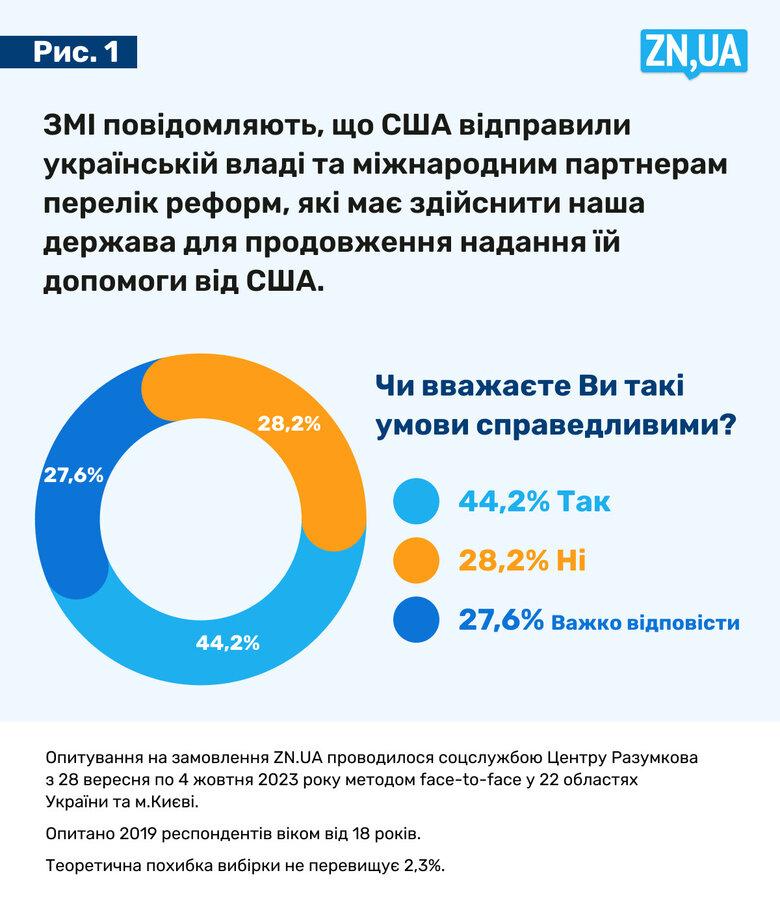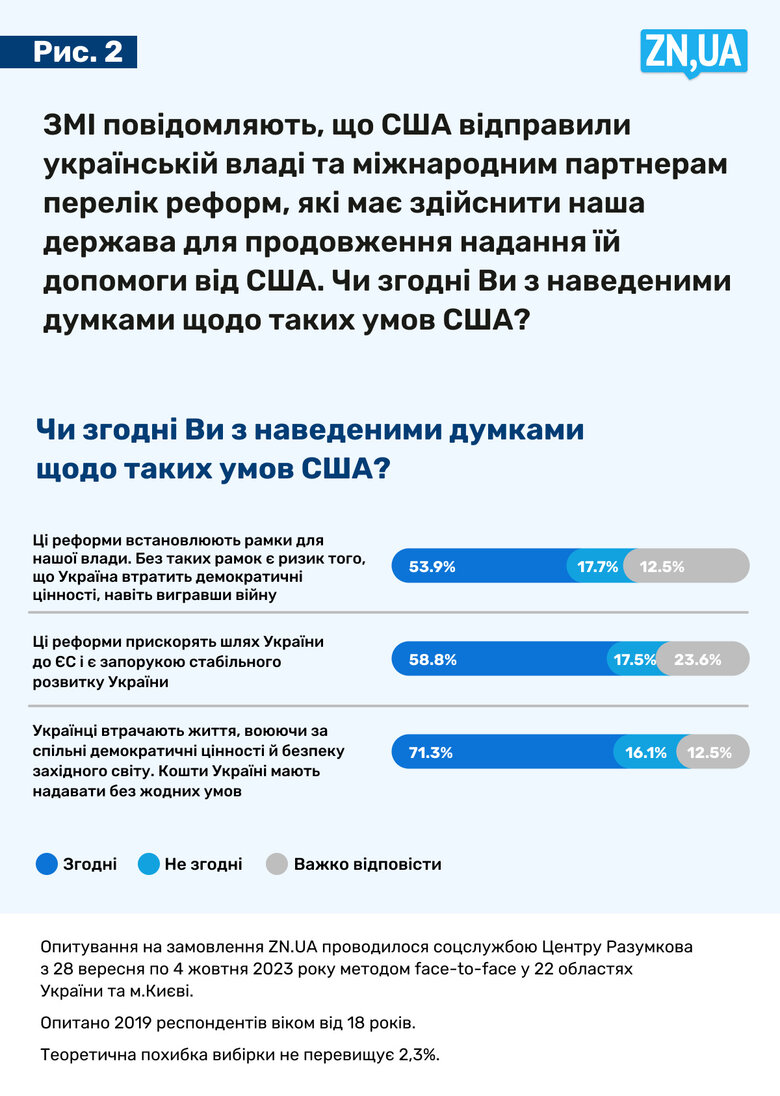US support for Ukraine: three different points of view
The United States is providing us with unprecedented support, without which neither the war nor our existence is possible. They are convinced that in return, Ukraine must strengthen its anti-corruption fight and ultimately embark on a path of change.
The Ukrainian authorities are convinced that any "buts" are inappropriate, and even minimal pressure is perceived with not always well-hidden indignation.
Ukrainians would not be Ukrainians if, on the one hand, they did not demand anti-corruption changes and reforms, and on the other hand, they demanded maximum loyalty and concessions for their current and future victories.
How do you focus on change if these three pairs of eyes are looking in different directions?
The US viewpoint
The US Department of Defence Inspector General Robert Storch will soon be packing his bags - he is scheduled to arrive in Ukraine on 18 October. His mission is to oversee the $113 billion in funding that Washington has allocated to Kyiv since the start of the great war, from weapons to humanitarian aid.
He and US Special Representative for Ukraine's Economic Recovery Penny Pritzker are the State Department's response to accusations of "unprecedented financial support for a corrupt country".
No one is refusing to support Ukraine "as long as it takes". But the realization that the process may take years, multiplied by the responsibility to taxpayers, requires action.
The catalyst for these actions is the heartburn that the top leadership of the United States is experiencing from the top leadership of Ukraine.
The fascination with Zelenskyy is long gone. The self-confident behavior that allowed him to hold the world's attention at the beginning of the great war no longer causes anything but indignation. The rudeness is annoying. Rejection of authority is surprising. Haphazardness is upsetting. The concentration of power is disconcerting. Corruption, about which the United States knows even more than we do, is frankly infuriating. So is the personnel policy, in which the main and only criterion is loyalty and professional qualities are not taken into account at all.
The US does not like many things, but they will not abandon us because of their global responsibility, their upcoming elections, and their respect for Ukrainians. So the Americans will cooperate with Bankova Street, albeit with rubber gloves and noses held up. But on their own terms.
The United States is a country of mature institutions, and they will work with these institutions, systematically implementing the world's best practices.
Ukraine is a country of people who are "understandable" to the authorities, who enter any institution and manually turn best practices into schemes.
The Americans are aware that this process will not be easy. However, the experience of our cooperation with the IMF has shown them that Ukrainians fulfill the conditions only at the beginning of cooperation when money is needed most. So they are starting right now. All the lists of reforms currently announced in exchange for money are just undetailed announcements. Ms Pritzker has a list of specific changes in exchange for specific amounts of money, without which our country simply cannot survive.
It seems to work, but we may not like the result to some extent. Let's remember where Penny Pritzker saw Ukraine's huge opportunities - in agriculture, energy, metallurgy, and mining. It doesn't sound like the development of a high-tech country, but rather a raw material base.
It is also worth considering the feasibility of copying the same best practices that will not work here anyway and finding an alternative way of development, with fine-tuning to our realities. Moreover, the modern world is changing very rapidly and the age-old classics have long ceased to work, as proven by China's economic growth, Israel's security system, and the US democracy.
Both the global strategy for Ukraine's development and its individual elements, up to and including the tools, require at least an unblurred eye and should be born out of discussions, not handed down from above. But this is impossible without cooperation with our government, and our government is not ready to cooperate.
Bankova's view
Zelensky resists any outside interference, protecting his own subjectivity, not ours. The reason for this resistance is simple: a year ago, he had everything he loved most - applause and money. The applause is fading, and Washington wants to control the money.
At times, this resistance has reached the point of absurdity. In an interview with CNN, President Zelensky said that corruption in Ukraine is not related to partner assistance, "it's not about our partners' weapons, it's not about money for weapons, it's not about money for the budget to pay pensions, social support, etc.; these are other things, it's not about partners."
Indeed, all military expenditures are financed by the state budget of Ukraine, and everything else that the state budget does not have enough money for after military expenditures is financed by partners. But the president's statement is shameful, no matter what. If public finances really were two pockets with "our" and "their" money, it would mean that we are not being stolen for social security, but money for war. Of course, public finances are more complicated, and if they steal from "our" pocket, the shortfall must be compensated for from "their" pocket, which means that partners have to replenish it, again and again, to make sure that there is enough for social security because someone is stealing somewhere.
It's bad enough that the president speaks about things he doesn't understand, but it's even worse that he does so in an attempt to justify himself, without acknowledging the problem and demonstrating his unwillingness to be constructive.
He still does not realize the inevitability of what is about to happen, going through the classic stages of grief - denial, anger, bargaining. The first reaction was a meeting in the OP, where the main topic of discussion was ways and means to simulate compliance with the State Department's demands as long as possible.
It's hard to comment on this, because it's one thing to be outraged that exhausted Ukraine at war is being asked to perform other tasks besides military ones, and it's another to try to sway its main ally in an existential war.
In addition, problems in our communications with partners have become apparent. On the one hand, Zelensky cannot get rid of his environment, which is as toxic as possible for the Americans, which makes dialogue with them very difficult. On the other hand, all those who have managed to establish more or less constructive personal relations with the United States, such as Zaluzhnyi, Kudrytskyi, and Kubrakov, are regularly blackballed. Zelenskyy is confident that in his sultanate, only he and Vizier Yermak can talk to the US.
As a result, no one has been talking to anyone in confidence for a long time, with the exception of the military.
Defocusing the people
Enlisting the help of the Razumkov Centre's sociological service, ZN.UA asked Ukrainians how they see the current situation.
Fortunately, the population has a deeper understanding of the situation than the authorities, and their desire for change is unwavering. Despite the fact that people are suffering huge losses, living in fear for almost two years, with no prospects or planning horizons, they are not indifferent to the issue of corruption at the state level.
We asked the respondents whether they thought it was fair that Ukraine should implement reforms in order to continue receiving US assistance: 44% answered "yes" and 28.2% "no" (the rest chose the "difficult to answer" option - see Figure 1).
However, since the concept of justice is rather abstract, we asked our fellow citizens to agree or disagree with three theses about the conditions that the US is imposing on Ukraine in exchange for money. The theses represent different perspectives on the situation, and, notably, all three were supported by the majority of respondents (see Figure 2).
Ukrainians overwhelmingly (71.3%) agree that money should be provided without any conditions, because we are losing lives fighting for common democratic values and the security of the Western world (16.1% disagree, 12.5% find it difficult to answer). At the same time, 58.8% are convinced that the reforms proposed by the United States will accelerate Ukraine's path to the EU and are a guarantee of our country's stable development (17.5% disagree, 23.6% find it difficult to answer). 53.9% agree that the reforms proposed by the United States establish a framework for our government, without which there is a risk that Ukraine will lose its democratic values, even after winning the war (17.7% disagree, 28.4% find it difficult to answer). In other words, unlike Bankova, Ukrainians do not take proposals for change with a grain of salt, although they believe that it is a dubious decision to link the allocation of funds to the progress of reforms.
Accordingly, we were not surprised by people's attitudes to the US tightening control over the aid provided to Ukraine and launching inspections of its use (see Figure 3).
Respondents could support only one of the proposed theses. More than 40% chose the option "This is a fair decision because the US needs to report to taxpayers on the effectiveness of the use of funds allocated to Ukraine". The statement "Ukraine will benefit from additional control over the effective use of public money and resources" was supported by 36.5% of respondents. Only 14.6% chose the option "Constant emphasis on Ukraine's corruption reduces its support in the world". Even fewer people (2.5%) disagreed with any of the statements. Thus, those who simply understand the US position outnumber those who also support it, but the majority will definitely not resist.
***
However, we must remember that qualitative changes are hard work that requires the willingness and agreement of all participants.
This is not our option, as we see, because not all participants are ready for this cooperation. As long as the State Department imposes reforms, changes, and improvements on us without even consulting us, the current government will sabotage their implementation as much as possible. Worst of all, despite the fact that Ukrainians generally support reforms and are aware of their necessity, this does not mean that they are ready to replace the current saboteur government with people capable of cooperating with partners and looking for the development paths the country really needs. At the very least, because they are not even on the horizon at the moment.
Therefore, we are unlikely to see systemic and rapid transformations, unfortunately, once again believing that even point improvements are a good result.
Yulia Samayeva, author of ZN.UA



